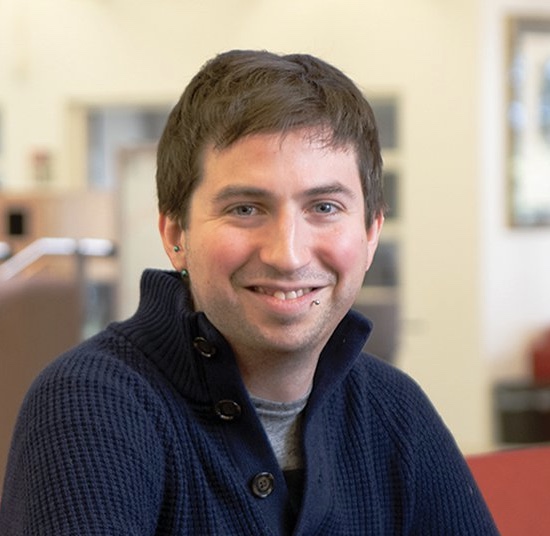 |
George CantwellAssistant ProfessorProbabilistic Systems, Information, and Inference group Department of Engineering University of Cambridge gtc31@cam.ac.uk |

|
I am an Assistant Professor of Innovative Computational Methods at the University of Cambridge, where I am a member of the Probabilistic Systems, Information, and Inference (Ψ²) group. I received a PhD in Physics from the University of Michigan and then completed a postdoctoral fellowship at the Santa Fe Institute.
A physicist by training, I now research in the areas of network science, complex systems, and statistical inference. I am particularly interested in the computational aspects of these areas.
If you are interested in studying for a PhD at the University of Cambridge in networks, complex systems, or statistical inference, please feel free to contact me before applying.
Papers
-
Model inference for ranking from pairwise comparisons
Daniel Sánchez Catalina and George T. Cantwell
arXiv preprint (2025) [arXiv] -
Embedding networks with the random walk first return time distribution
Vedanta Thapar, Renaud Lambiotte, and George T. Cantwell
arXiv preprint (2025) [arXiv] -
The threshold and quasi-stationary distribution for the SIS model on networks
George T. Cantwell and Cristopher Moore
arXiv preprint (2025) [arXiv] -
Approximation for return time distributions of random walks on sparse networks
Erik Hormann, Renaud Lambiotte, and George T. Cantwell
Phys. Rev. E 111, 064306 (2025) [arXiv] -
Valence and interactions in judicial voting
Edward D. Lee and George T. Cantwell
Phil. Trans. R. Soc. A, 382:20230140 (2024) [code] -
Heterogeneous message passing for heterogeneous networks
George T. Cantwell, Alec Kirkley, and Filippo Radicchi
Phys. Rev. E 108, 034310 (2023) [code] [arXiv] -
Approximate sampling and estimation of partition functions using neural networks
George T. Cantwell
arXiv preprint (2022) [code] -
Belief propagation for permutations, rankings, and partial orders
George T. Cantwell and Cristopher Moore
Phys. Rev. E 105, L052303 (2022) [code] [arXiv] -
The friendship paradox in real and model networks
George T. Cantwell, Alec Kirkley, and M. E. J. Newman
Journal of Complex Networks 9(2), cnab011 (2021) [arXiv] -
Belief propagation for networks with loops
Alec Kirkley*, George T. Cantwell*, and M. E. J. Newman
Science Advances 7(17), eabf1211 (2021) [arXiv] -
Bayesian inference of network structure from unreliable data
Jean-Gabriel Young, George T. Cantwell, and M. E. J. Newman
Journal of Complex Networks 8(6), cnaa046 (2021) [code] [arXiv] -
Inference, Model Selection, and the Combinatorics of Growing Trees
George T. Cantwell, Guillaume St-Onge, and Jean-Gabriel Young
Phys. Rev. Lett. 126, 038301 (2021) [code] [arXiv] -
Thresholding normally distributed data creates complex networks
George T. Cantwell*, Yanchen Liu, Benjamin F. Maier*, Alice C. Schwarze, Carlos A. Serván, Jordan Snyder, and Guillaume St-Onge
Phys. Rev. E 101, 062302 (2020) [code] [arXiv] -
Improved mutual information measure for clustering, classification, and community detection
M. E. J. Newman, George T. Cantwell, and Jean-Gabriel Young
Phys. Rev. E 101, 042304 (2020) [code] [arXiv] -
Message passing on networks with loops
George T. Cantwell and M. E. J. Newman
Proc. Natl. Acad. Sci. U.S.A. 116, 23398-23403 (2019) [code] [arXiv] -
Mixing patterns and individual differences in networks
George T. Cantwell and M. E. J. Newman
Phys. Rev. E 99, 042306 (2019) [code] [arXiv] -
Balance in signed networks
Alec Kirkley, George T. Cantwell, and M. E. J. Newman
Phys. Rev. E 99, 012320 (2019) [arXiv] -
Efficient method for estimating the number of communities in a network
Maria A. Riolo, George T. Cantwell, Gesine Reinert, and M. E. J. Newman
Phys. Rev. E 96, 032310 (2017) [code] [arXiv] -
Perceptual category learning and visual processing: an exercise in computational cognitive neuroscience
George Cantwell, Maximilian Riesenhuber, Jessica L. Roeder, and F. Gregory Ashby
Neural Netw. 89: 31–38. (2017) [pdf] -
Multiple stages of learning in perceptual categorization: evidence and neurocomputational theory
George Cantwell, Matthew J. Crossley, and F. Gregory Ashby
Psychon. Bull. Rev. 22: 1598-1613 (2015) [pdf]
Thesis
- Correlation in Complex Networks, George Tsering Cantwell (2020)